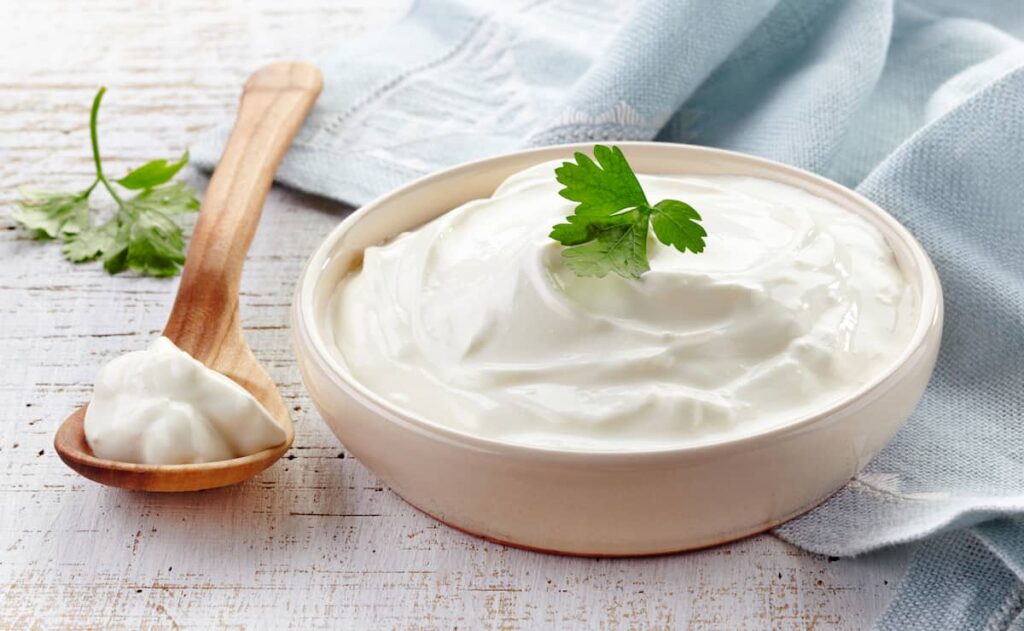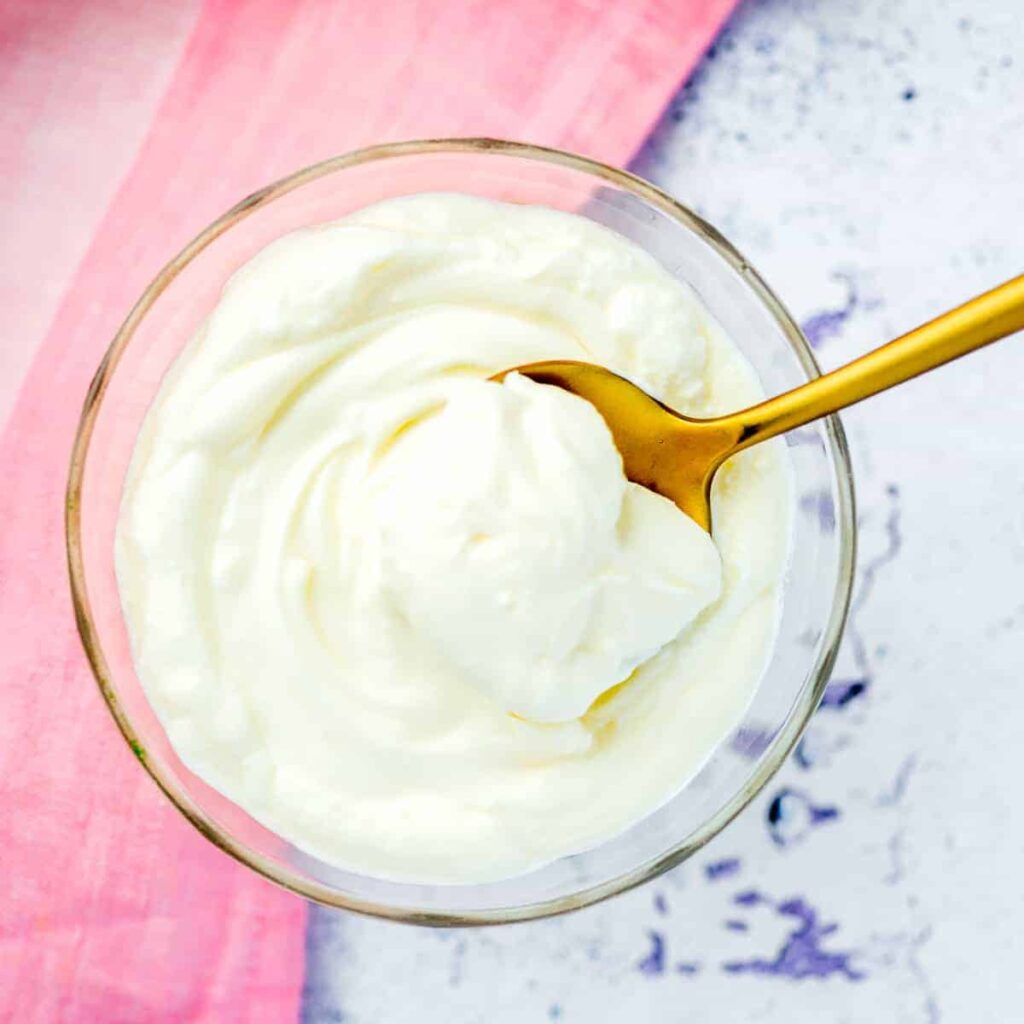Have you ever wondered that can you microwave sour cream? While this may seem like a silly question, the answer is actually very important because of the potential health risks associated with eating foods that have been prepared in an unsafe manner.
Knowing how and when to safely heat up your favorite food can make all the difference between an enjoyable snack or meal and a potentially dangerous one.
In this blog post, we’ll explore about can you heat up sour cream in the microwave or not, as well as provide tips for doing so safely.
Can You Microwave Sour Cream?
The short answer is Yes, you can microwave sour cream. However, the long answer is a bit more complicated.

While it may be safe to do so in certain circumstances and with certain precautions taken, there are also potential safety risks involved with microwaving this type of food.
When microwaving sour cream, keep in mind that it is important to watch the temperature carefully and take steps to avoid overheating or burning the sour cream.
If heated too quickly or for too long a period of time, the fat content of the sour cream could separate from the liquid resulting in an unpleasant texture and taste.
Additionally, over-heating sour cream can cause some components to break down releasing potentially harmful bacteria into your meal.
Therefore, when microwaving sour cream, it is important to watch the temperature closely and heat in short bursts of time.
Can You Warm Up Sour Cream With Other Ingredients?

Another consideration when it comes to microwaving sour cream is whether or not you can warm up sour cream with other ingredients.
This is an important question to answer as some food combinations, such as dairy and acidic foods (e.g., tomatoes), may alter the flavor of your meal while also increasing the risk of harmful bacteria growth due to improper heating.
The safest way to warm up sour cream with other ingredients is to add the sour cream at the end after all other components have been heated. This will ensure that all ingredients in the dish are heated evenly without any risks associated with over-heating the sour cream itself.
Furthermore, if you plan on adding hot items such as cooked pasta or vegetables, make sure that they are cooled down to room temperature before adding the sour cream.
Related Topic You Can Read
- Can You Microwave Almond Milk? (Yes, Here’s How To Do)
- Can You Microwave Milk? (Answered & Detailed Guide)
- How To Melt Butter In Microwave – Perfect Results In Seconds
- How To Melt Cheese In Microwave – The Ultimate Guide
- Can You Microwave Alcohol? Find Out the Truth Here!
What is Sour Cream?
Before we dive into the safety considerations of microwaving sour cream, let’s take a moment to review what exactly sour cream is and how it is made.
Sour cream is a dairy product made from cow’s milk, heavy cream or both.

The traditional production method involves adding lactic acid bacteria such as Lactococcus lactis or Leuconostoc citrovorum to the milk/cream mixture which causes fermentation and thickening. This fermentation process is why sour cream has its characteristic tangy flavor.
When shopping for sour cream, you may come across several different varieties including reduced-fat options and non-dairy alternatives such as coconut milk or cashew cream based varieties.
While these alternative options may be easier to find in stores today, for the purpose of this discussion, we’ll be focusing on traditional sour cream made from cow’s milk and heavy cream.
What Happens When You Microwave Sour Cream?
When sour cream is microwaved, several things can happen depending on the amount of time it is heated and the power of the microwave. Here are a few outcomes we discovered during our tests:
1. Separation: As sour cream is heated, the fat separates from the liquid. This separation can cause the liquid to pool on top of the sour cream, creating a watery texture.
2. Curdling: If sour cream is microwaved for too long or at too high of a power level, it can curdle. Curdling occurs when the proteins in the sour cream denature and the liquid separates from the solids, creating a lumpy texture.
3. Expansion: Because sour cream contains water, it can expand when heated. This expansion can cause the sour cream to bubble and rise, creating a mess in the microwave.
4. Burning: If sour cream is microwaved for too long or at too high of a power level, it can burn. Burning occurs when the heat causes the sour cream to break down and turn brown or black.
In conclusion, microwaving sour cream can lead to a variety of outcomes, some desirable and some not. It is important to be careful and monitor the sour cream while it is being heated to avoid any unwanted surprises.
So, what’s the verdict? Is microwaving sour cream a good idea? The answer is that it depends on what you are using it for.
If you are heating up a dish that contains sour cream, it is safe to microwave it for a short period of time. However, if you are looking to use microwaved sour cream as a topping or ingredient in a dish, it is best to avoid it as the texture and taste may be compromised.
How to Microwave Sour Cream Safely
If you choose to microwave sour cream, there are a few steps you can take to ensure that your food is heated in the safest manner possible.
1️⃣ First, it is important to monitor the temperature of the sour cream closely and, if possible, use an instant-read thermometer to ensure that it does not exceed 140°F (60°C).

2️⃣ Additionally, heat only for short bursts of time (no more than 30 seconds at a time) and stir regularly.
This will help prevent the fat content from separating from the liquid resulting in an unpleasant texture and taste.
3️⃣ Finally, make sure that your container is microwave safe and covered securely before heating as this will help keep your sour cream from splattering or boiling over into the microwave.
Safety Tips for Microwaving Sour Cream
Now that you have a bit more background information about sour cream, let’s review some safety tips for microwaving it.
1. Use low heat settings
Start by setting your microwave to 50-60% power when heating up sour cream. This will help prevent overheating and burning.
2. Monitor temperature closely
As mentioned earlier, watch the temperature carefully and take steps to avoid overheating or burning the sour cream.
Stop microwaving every few seconds and stir the mixture thoroughly before continuing with the heating process again if necessary.
3. Don’t overheat
Allow the sour cream to cool off before eating. Overheating can cause some components to break down releasing potentially harmful bacteria into your meal.
4. Use microwave safe containers
Choose a container that is specifically labeled as “microwave-safe” when heating up sour cream. This will help keep your food from splattering and boiling over while in the microwave.
Following these simple tips can help ensure that your experience with microwaving sour cream goes smoothly and safely!
With just a few precautions, you can enjoy delicious dishes made with this versatile dairy product without having to worry about potential safety issues.
So go ahead and warm up your favorite recipes with sour cream – just remember to do it safely!
Benefits & Drawbacks Of Using A Microwave To Warm Up Sour Cream
✅ The main benefit of using a microwave to warm up sour cream is that it is convenient and quick.
Microwaving sour cream is much faster than heating it over the stove, and it also requires less monitoring since you do not need to constantly stir the mixture as you would when cooking over a stove top.
However, there are some drawbacks to consider before microwaving your sour cream. Although microwaving can help preserve the taste and texture of the dairy product, it can have negative impacts on nutrition if done improperly.
⛔️ If too much heat is applied for too long, some of the essential nutrients in sour cream can be lost or destroyed.
⛔️ Additionally, overheating may also cause separation of fat in the mixture which will result in an unpleasant texture and taste.
Overall, microwaving sour cream can be a convenient way to heat it up quickly, but you should still take the proper steps to ensure that your food is heated safely.
Monitor the temperature closely and use low heat settings when possible in order to preserve the flavor and nutrition of the sour cream while avoiding potential safety risks.
With just a few precautions, you can enjoy delicious dishes made with this versatile dairy product.
Alternatives to Microwaving Sour Cream

If you are not comfortable with using a microwave to heat up your sour cream, there are other methods available.
1️⃣ One option is to use the stove top. However, this method requires more active monitoring than microwaving does as it needs to be stirred regularly in order to prevent burning or separation of fat in the mixture.
2️⃣ Another alternative is to use a double boiler. This method can help maintain the temperature at a steady level and ensure that the sour cream does not get too hot too quickly.
It can also help preserve some of its nutritional value while avoiding potential safety risks associated with overheating.
3️⃣ Lastly, you can simply let your dish cool off before serving if it has been cooked with cold ingredients such as sour cream. This can help you avoid the risks associated with microwave use and still enjoy your favorite dishes with a safe and delicious result.
No matter which method you decide to use, always remember to monitor the temperature closely and take steps to ensure that your sour cream is heated safely.
With just a few extra precautions, you can have delicious dishes made with this versatile dairy product without having to worry about potential safety issues.
So go ahead and warm up your favorite recipes with sour cream – just remember to do it safely!
FAQs on Can You Microwave Sour Cream
Can you heat up sour cream?
Yes, you can heat up sour cream in the microwave or on the stove top. However, it is important to monitor the temperature closely and use low heat settings when possible in order to preserve the flavor and nutrition of the sour cream while avoiding potential safety risks.
Is microwaving sour cream safe?
Yes, if done properly, microwaving sour cream can be a safe way to heat it up quickly. Monitor the temperature closely and use low heat settings when possible in order to preserve the flavor and nutrition of the sour cream while avoiding potential safety risks.
Is sour cream okay to be warmed up?
Yes, sour cream is safe to be warmed up as long as it is done properly. Monitor the temperature closely and use low heat settings when possible in order to preserve the flavor and nutrition of the sour cream while avoiding potential safety risks.
Does sour cream curdle when heated?
Yes, sour cream can curdle when heated if it is cooked at too high of a temperature or for too long. Monitor the temperature closely and use low heat settings when possible in order to preserve the flavor and texture of the sour cream while avoiding potential safety risks.
When should you not eat sour cream?
You should not eat sour cream that has been left out at room temperature for more than 2 hours as it can spoil and become unsafe to consume.
Properly refrigerated sour cream is safe to eat up to its expiration date. Additionally, if the sour cream has a strange smell or texture then it should also be discarded.
To ensure safety, always check the packaging, expiration date, and appearance before consuming any sour cream. If you have any doubts about its safety do not consume it.
It’s better to err on the side of caution when it comes to food safety. Always remember: when in doubt, throw it out!
In Summary
In my opinion, microwaving sour cream is not recommended but can be done safely in some cases. It’s important to follow the manufacturer’s instructions for safe use and to be patient with the results.
Sour cream will heat up quickly at high power settings, forming pockets of boiling hot liquid that can cause curdling or splitting when stirred.
Be sure to keep a close eye on the microwave and stir it frequently to avoid over-cooking or burning. Additionally, opt for sour cream that has a relatively high fat content for better end results.
Doing so may prevent the inconvenience of dealing with unrecognizable ingredients post-heating. All in all, it’s best to avoid microwaving sour cream unless absolutely necessary or as indicated by the packaging instructions!
We hope that this article has enlightened you on can you warm up sour cream and how to do it properly if necessary. Enjoy your favorite dishes with the confidence that they are safe for consumption!
Happy cooking!



